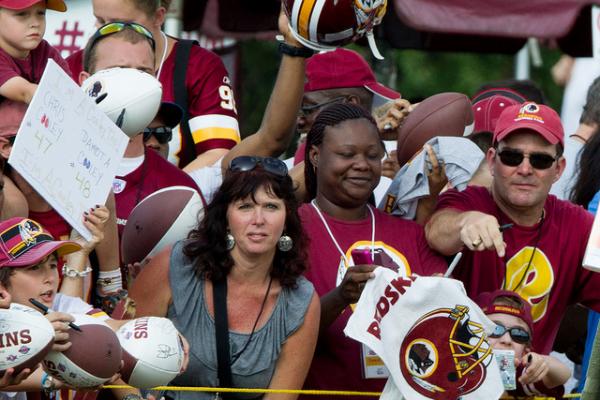The Oneida Indian Nation’s campaign against the Washington pro football club’s team name picked up new supporters this week when more than two dozen clergy in the Washington region committed to taking the fight to their pulpits.
“Black clergy have been the conscience of America,” Oneida Nation representative Ray Halbritter said to a gathering of roughly 40 people on folding chairs in the basement of Plymouth Congregational United Church of Christ. “This is not a fight we could do by ourselves, or should do by ourselves.”
The Rev. Graylan Hagler, senior minister at Plymouth, asked for a show of hands Wednesday to indicate which clergy members in attendance would be willing to preach against what he termed the “R word.” More than a dozen raised their hands. Hagler said that a different dozen committed to the cause at a clergy breakfast meeting Wednesday and that, all told, he has commitments from roughly 100 clergy members to talk to their congregations in coming weeks.
Clergy at the afternoon meeting came from a range of churches, including African Methodist Episcopal, Baptist and United Church of Christ, and from as far north as Baltimore and as far south as Fredericksburg, Va.
“Collectively, we’re speaking to thousands of people every week,” Hagler told them. He has been speaking out against the team name for more than 20 years.
Joan Middleton, one of Hagler’s congregants, concedes that his sermons equating the “R word” to the “N word” have changed her mind, slowly, over time. And yet, she says, she just can’t let go of her team’s totems. They mean too much to her.
“In all honesty, I never thought it was any kind of problem,” she says. “Now I understand why it should change, I really do. But I have a lot of the paraphernalia, and I don’t want to give it up.”
Hagler’s largely African-American church in northeast Washington serves as a sort of microcosm of the wider Washington region and the team’s national fan base. Some members agree with their pastor that the name should go. Some love the name unconditionally and hope it never changes.
And then there’s Middleton’s middle ground, her ambivalence a pained prism through which to view competing emotions. Does love of team transcend respect for others? Can a trademark trump a trail of tears?
The long-simmering debate over a two-syllable noun that dictionaries define as offensive appears near full boil. What’s different now is the emergence of the Oneida Indian Nation as a full-throated opponent of the name with a public relations staff to rival the NFL’s.
Earlier this month, the Oneidas held a symposium in Washington to brand the name as a hateful, racist epithet that should be consigned to history’s dustbin. Team owner Daniel Snyder wrote a letter, released later that week, defending the name on the basis of polling, tradition, and childhood memories. It carried a gentler tone than Snyder’s barbed statement to USA Today in May that he’d never change the name: “NEVER — you can use caps.”
The Oneidas, who expect to meet with representatives from the NFL to talk about the matter next month, operate a Change the Mascot campaign that includes a website and a series of radio ads. Between Wednesday’s morning and afternoon meetings, Halbritter met with U.S. Reps. Betty McCollum and Eleanor Holmes Norton on Capitol Hill.
Suzan Shown Harjo, who has led the fight against the team name for decades, received a standing ovation at the afternoon meeting. She said team mascots tend to be “wild animals, the occasional lug nut and slug, and then us. And that hurts our children.”
Hagler urged clergy members to gather petitions at their churches to send to Snyder and NFL Commissioner Roger Goodell.
“The derogatory term ‘redskin’ offends many Native Americans and others in this country,” the petition says in part. “This word, defined in the dictionary as a slur, should not be publicly marketed and celebrated in America, which is built on the ideals of respect and inclusion. As representatives of our faith communities, we believe that this is a moral issue and we therefore have an obligation to step forward to join the Change the Mascot movement.”
Erik Brady writes for USA Today.
Got something to say about what you're reading? We value your feedback!
